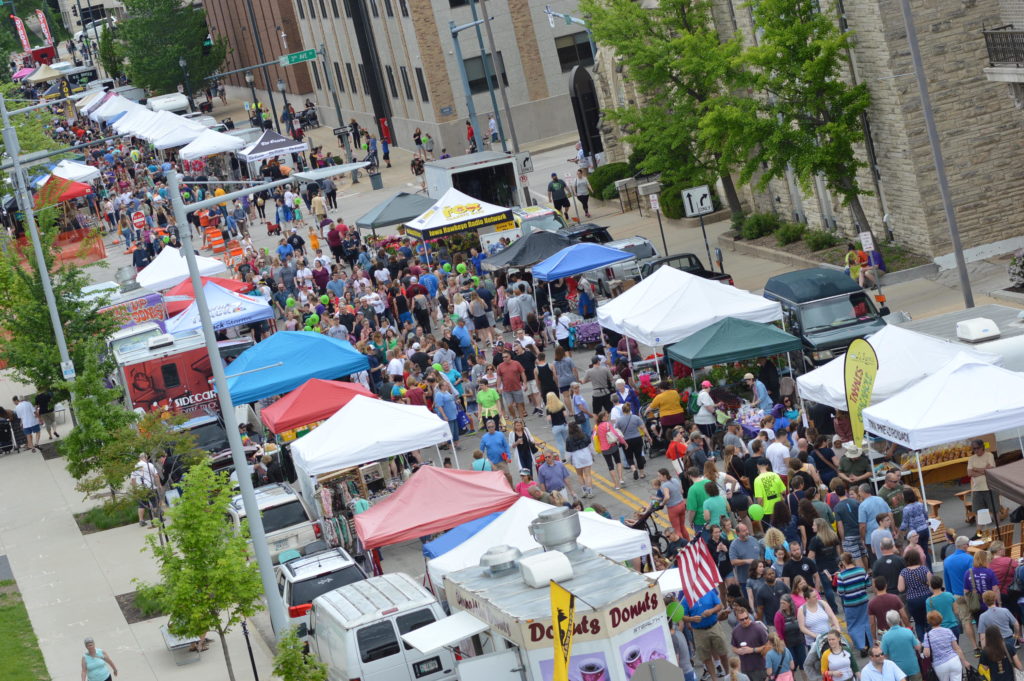
A crowd makes its way down Fifth Street SE during opening day of the Downtown Farmers Market last year in Cedar Rapids, Iowa. (photo/Cindy Hadish)
This story also was published on IowaWatch.org
By Cindy Hadish
Loyal customers eagerly line up 30-people deep to buy the Guzman family’s mouth-watering southwestern burgers during the farmers market in Washington, Iowa, while live music attracts crowds in the town’s Central Park.
Those jam-packed lines, and even live entertainment during the markets, will be relegated to the past — at least for now — in light of changes underway in response to the novel coronavirus pandemic.
Related: Indoor farmers markets adjust to coronavirus pandemic
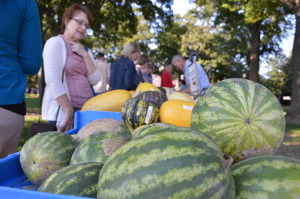
Customers look at watermelon and other items at the Washington, Iowa, farmers market, during a previous season. (photo/Cindy Hadish)
“It’s a whole new world,” said Bob Shepherd, Washington’s market manager, who also serves on the board of the Iowa Farmers Market Association.
While the Washington market plans changes for its upcoming season, others remain in limbo, awaiting direction from the state.
In neighboring Minnesota, the Department of Agriculture declared farmers markets an essential service, making them exempt from closure during the pandemic, similar to grocery stores.
Market managers and vendors are still awaiting word on the status in Iowa, even as the outdoor season approaches, causing some markets to postpone their seasons.
Keely Coppess, communications director for the Iowa Department of Agriculture & Land Stewardship, said the department is working with the Iowa Department of Public Health to provide guidance to the state’s farmers markets, with a goal by the end of April.
Declaring farmers markets an essential service would only come into play if Iowa had a “shelter in place” order, which Gov. Kim Reynolds has not put into place, Coppess said.
Rather, food and agriculture in Iowa are considered critical infrastructure, leaving markets to interpret guidelines on their own.
Coppess cited a U.S. Department of Homeland Security letter that doesn’t specifically cite farmers markets, but lists food and agriculture as critical infrastructure.
Washington tentatively plans a start date of Thursday, May 28 — later than its usual mid-May start — but might even push back the schedule to June.
Shepherd noted that the weekly outdoor market typically attracts 35 to 50 vendors, with up to 1,500 customers.
Changes being considered due to the pandemic include allowing only 100 customers into the park at a time and marking 6-foot intervals for social distancing to limit the crowding of people in lines.
Vendors who sell their handmade crafts might not make the cut, as the market focuses on essential foods, and at this time, live entertainment is not planned to be featured, to avoid crowds from gathering. Customers won’t be allowed to eat in the park, either.
“I always said a strong factor of the farmers market is the social aspect,” Shepherd said. “Now you can’t have that.”
An increased emphasis will be made on sanitation, with portable hand-washing stations set up in the park, while vendors will be required to have different people handling the money and products, with frequent disinfection of table surfaces.
“We’re going to do what we need to do to make sure it’s safe and the product is available to people,” Shepherd said. That might even include a “drive-up” option in which customers would place their orders and receive it at the market without leaving their vehicle.
That “no contact” market is also among options under consideration for the Iowa City Farmers Market, where the opening day has been postponed until Saturday, June 6.
Organizers cite the U.S. Centers for Disease Control & Prevention (CDC) recommendation that gatherings be limited to no more than 10 people.
Typically, the popular market is held on Wednesdays and Saturdays in Iowa City’s Chauncey Swan Parking Ramp, from the first week in May through the last week in October.
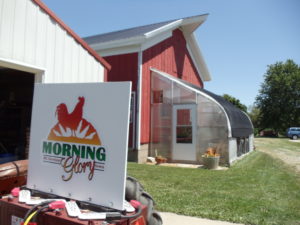
Morning Glory is a Community Supported Agriculture farm near Mount Vernon, Iowa. (photo/Cindy Hadish)
Farmers Market Coordinator Tammy Neumann cited a letter from State Horticulturist Paul Ovrom, which noted that the Iowa Farmers Market Association asked Gov. Reynolds for clarity on the status of the markets going forward, and provided her office with a list of recommendations that markets should enact for the 2020 season.
Ovrom’s letter promises guidance for Iowa’s farmers markets “in the very near future.”
Neumann noted customers in the meantime are encouraged to contact vendors directly, with a list available at www.icgov.org/farmersmarket.
Market postponements are leaving farmers like Donna Warhover scrambling.
“I feel as if I’m re-working my business plan on a daily basis,” said Warhover, who operates Morning Glory, a Community Harvest Farm in rural Mount Vernon, Iowa.
Due to farmers markets postponements, she has increased the number of Community Supported Agriculture (CSA) shares she is offering this year.
“The (postponement) of farmers markets has not only impacted the expected revenue from produce sales, but also the anticipated revenue generated by our food truck,” Warhover noted. “Like so many small business owners, we’ve had to revamp our website to include more online purchasing options and will rely on more of an online business model than we ever imagined.”
That includes offering transplants for sale online, as well as additional vegetable boxes whenever she has a surplus of produce planted in anticipation of farmers markets and institutional sales that no longer exist.
Morning Glory’s food truck had planned to have a presence at the large-scale Downtown Farmers Market in Cedar Rapids, but the May 23 market has been cancelled, with another market added over Labor Day weekend.
Ellen Bardsley, interim communications manager for the Cedar Rapids Metro Economic Alliance, said the group, which hosts the downtown market — now in its 15th year — is following guidance of public health officials.
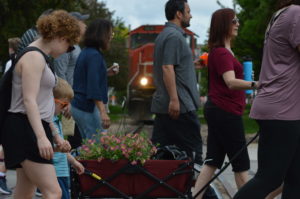
Downtown Farmers Market customers stream across the railroad tracks as a train backs up in downtown Cedar Rapids on opening day in 2019. (photo/Cindy Hadish)
That includes whether or not reusable bags, which typically are encouraged, will be banned from use.
As they have for years, the markets plan to feature local musicians and other talent throughout the venue, Bardsley said, and vendors that offer items other than food will be allowed to sell their wares.
One of the largest outdoor markets in the Midwest, the Downtown Farmers Market features about 200 vendors at each market, selling produce, flowers, prepared foods, pet items, artisan goods, such as jewelry, clothing and home décor, baked goods, alcohol and soap, lotion and other toiletries.
See photos from the 2019 opening day.
Bardsley said portable hand washing stations have been present at the market for years and will be present throughout the venue again this year.
She did not specify any changes that may be considered for crowd control at the twice-monthly markets, which attract an average of 14,000 people at each. New Downtown Farmers Market dates are June 6, June 20, July 4, July 18, August 1, August 15, September 5 and September 19, from 7:30 a.m. to noon.
The ultra-popular Market After Dark is set for the night of Aug. 22, but that could change.
“The spread of coronavirus and its impacts on public gatherings continue to evolve by the day,” Bardsley said. “We understand that future adjustments to the market may be necessary for the health and safety of all.”
Jake Kundert, food systems director for the Amana-based Iowa Valley RC&D, has been trying to give direction to farmers market managers, but is still awaiting guidance from the state.
“It’s just kind of a gray area right now,” said Kundert, who works with markets across Iowa. “We’re just waiting for it to play out, so we’re kind of in limbo.”
He cited the discrepancy between the CDC guidelines that advise against gatherings of more than 10 people and Iowa’s general guidance that farmers markets might be classified similar to grocery stores.
Kundert has been in contact with other states, which are taking differing approaches, including the “no contact” markets, with touchless payment systems, and others that are physically realigning market spaces, spreading out vendors to greater distances and marking off 6-foot spans for customers to use as a social distancing gauge.
As Warhover is doing with Morning Glory, other farmers are making a greater shift to direct-to-consumer models as they await word on this year’s farmers markets, he said.
“This is a time to support our local producers,” Kundert said, citing planting underway, as farmers invest in seeds and other necessities. “The food will be here for us to buy and enjoy, in whatever way that happens.”
Last year’s Market After Dark in Cedar Rapids attracted 50,000 people. See photos here.
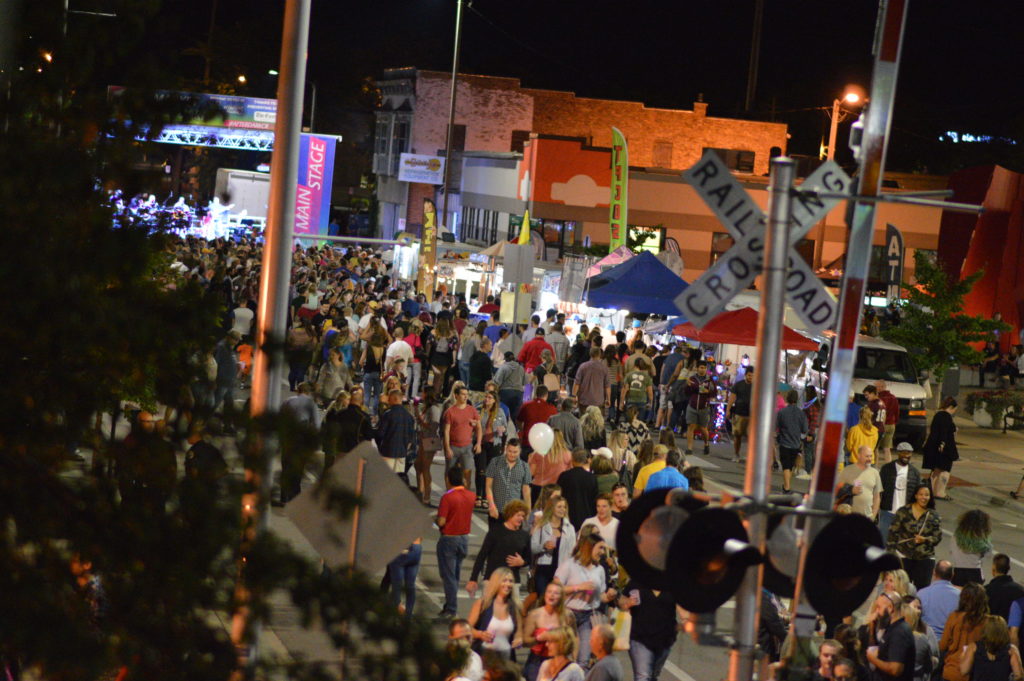
Market-goers make their way along Fourth Avenue SE on Saturday, Aug. 24, 2019, during Market After Dark in downtown Cedar Rapids, Iowa. (photo/Cindy Hadish)

No Comments Yet